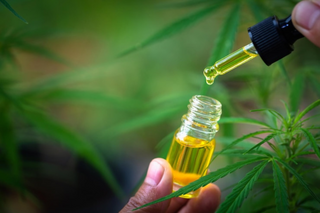CBD oil is one of the most popular ways to experience the potential benefits of CBD. But a common question remains: How long does CBD oil take to work? Whether you're using CBD oil for anxiety, pain, inflammation, or sleep, the time to feel the effects can vary depending on how you use it and how your body responds.
In this guide, we’ll explore how fast CBD works, how long it lasts, and how often to take CBD oil for optimal results, including comparisons between oil, edibles, vapes, and topicals.
What Is CBD Oil?
CBD, short for cannabidiol, is a non-psychoactive compound found in the hemp plant. Unlike THC, it won’t make you feel “high.” CBD oil typically contains CBD extract (full-spectrum, broad-spectrum, or isolate) mixed with a carrier oil like MCT or hempseed oil.
- CBD oil is commonly used for
- Reducing anxiety and stress
- Relieving chronic pain or joint pain
- Improving sleep
- Supporting inflammation and recovery
Most users take it sublingually (under the tongue) for quick absorption.
How Long Does It Take for CBD Oil to Work?
The effectiveness of CBD oil depends on the way of intake. Let’s break it down to analyze how long it takes for CBD to come into action.
1-Sublingual Intake
Sublingual intake means placing CBD oil drops under your tongue. Your oral mucous membrane absorbs the CBD oil drops, and they enter your bloodstream directly. It takes merely 30 seconds to absorb CBD oil through the mucous membrane. CBD oil effects vary, but in many users, it usually takes effect within 15 minutes. Its soothing effects last for approximately 4-6 hours, but it depends on the individual’s body metabolism.
2-CBD Edibles
CBD edibles such as gumdrops, sour belts, mists, or lollipops take advantage of immediate action when broken down by saliva in the mouth. Gastric juice and digestive enzymes totally dissolve the edibles. The edible breakdown, and the absorption of the ingredients from these edible forms take place from the small intestine into the bloodstream.
The metabolism in the liver should be active and efficient with cannabinoids, where the liver converts THC into a more potent version, 11-hydroxy-THC. Hydroxy-THC is much more potent than THC. The body distributes cannabinoids throughout after 30 minutes to 2 hours, depending on individual metabolism and the level of physical activity.
Once the onset is complete, the peak duration lasts between 4-6 hours, and occasionally, it can last up to about 8 hours.
3-CBD Vapes or Smoking
Because CBD vape enters the lungs, the body directly absorbs it into the bloodstream, which is the fastest way to deliver CBD into the body. Within roughly 5-10 minutes, CBD works after absorption. CBD offers the highest range of absorption of any CBD product, with up to 56% of the CBD absorbed from a CBD vape.
Its effect lasts up to 2-3 hours. Many people report feeling relieved in a stressful situation, which improves cognition by keeping them productive in the afternoon slump at work, and reduces the pain from some injuries.
4- CBD Topicals
CBD topicals such as CBD cream and CBD lip balms are commonly used for muscle pain, arthritis, and patchy skin treatment. CBD topicals take 15 minutes to 1 hour to take effect because they don’t enter the bloodstream. But its effectiveness lasts up to 4-6 hours.
How Long Does CBD Last in Your System?
The duration CBD stays in your system depends on several factors such as dosage, body fat, frequency of use, method of intake, metabolism rate, and more. Each consumption method affects how quickly CBD takes effect and how long it lingers in the body.
When using CBD oil sublingually, effects are typically felt within 15 to 45 minutes, and it can stay in your system for about 1 to 3 days. CBD edibles take longer to kick in, usually between 30 minutes and 2 hours, but they remain in the system for 3 to 7 days. If you choose to vape or smoke hemp, the effects can be felt within just 5 to 10 minutes, and CBD may stay in your system for up to 24 hours. Last, CBD topicals like creams or balms take effect within 15 minutes to an hour but do not enter the bloodstream, so they don’t remain in your system in the same way.
Factors Affect How Long CBD Stays in the Body
Dosage
High doses take longer to be eliminated from the body. If you are seeking undetectable levels of THC, then full-spectrum CBD oil with a THC concentration below 0.1% should be the answer.
Body Metabolism
Every individual has a different body metabolism. If a person leads an active lifestyle, then the time for the body to get rid of CBD is reduced. On the flip side, if an individual's metabolic rate is slow, the time for elimination by the body corresponds to a longer time frame. So here, it gets time to linger in the body.
Body Fat
CBD is a fat-soluble compound. It gets absorbed into fat cells faster and remains there for a long time. If you are taking CBD occasionally, then it won’t stay in your body for long. However, if you are taking regular doses, it will become part of the system, and it will normally take a month to be eradicated.
Usage Frequency
Regular CBD users have accumulated more CBD than occasional users.
Body compatibility
People who consume CBD regularly develop CBD tolerance. A higher tolerance of THC leads to active metabolism, which means it will stay in the body for less time.
Fatty Food-Consumption
If you are taking CBD dosage with any fatty food, it will bind with the fat and won’t leave your body quickly.
Body Fat Proportion
People with greater body fat percentages have CBD traces in their bodies for longer periods. At the same time, a low body percentage reduces the stay time of CBD.
CBD Vape Dosage Chart
Hence, CBD vaping and smoking are the quickest ways of CBD consumption, but still, the dose chart is important to consider. Vaping dosage depends on the patient's weight and the time required for effectiveness.

How Long Does CBD Oil Take to Work for Anxiety?
CBD oil takes just 30 seconds to absorb through the mucous membrane and takes effect within 15 to 45 minutes. And its soothing effects last for approximately 4-6 hours. CBD edibles take about 30 minutes to 2 hours, depending on metabolism and the level of activity involved. Its effectiveness remains between 4 and 6 hours and sometimes lasts up to about 8 hours.
CBD vape is the fastest way to deliver CBD into the body because it works within about 5-10 minutes of absorption. Its effect lasts up to 2-3 hours. CBD topicals take 15 minutes to 1 hour to take effect because they don’t enter the bloodstream. But its effectiveness is up to 4-6 hours.

How Often to Take CBD Oil?
Some users find it best to take CBD oil daily once or twice a day (preferably in the morning and at night), but it depends on individual needs. Take the proper dose of CBD oil if you feel any stressful condition. It’s best for instant relief of anxiety or stress. Take CBD regularly for chronic pain and insomnia issues.
Final Words
Navigating the world of CBD products can feel overwhelming, but finding the right fit for your needs is a vital step toward enhanced wellness. At Innovative CBD, we're dedicated to helping you make an informed choice by providing a range of professional-grade products crafted with our unique, solvent-free extraction process that preserves beneficial compounds like CBDa. Our commitment to quality, transparency, and the synergistic power of full-spectrum hemp ensures you get a superior product. Explore our full-spectrum CBD products, including our popular CBD vape pens, and experience the Innovative CBD difference today.
Disclaimer: The statements made on this blog have not been evaluated by the U.S. Food and Drug Administration (FDA). Our products are not intended to diagnose, treat, cure, or prevent any disease. The information provided on this website is not a substitute for individual medical advice.


